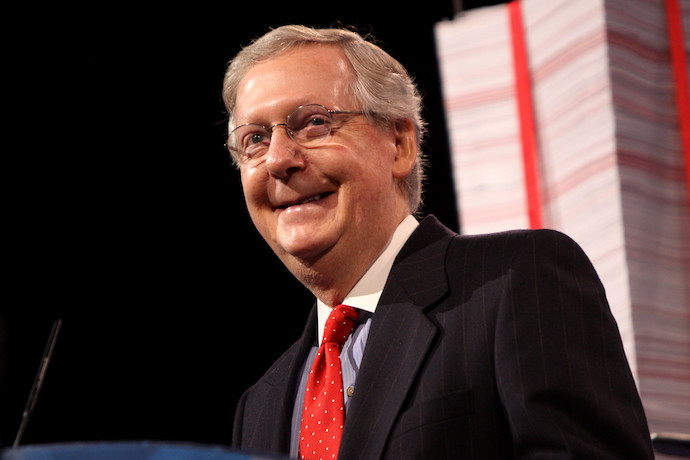Tuesday night President Trump gave his State of the Union address, the night before his acquittal in a sham impeachment trial in the U.S. Senate. To paraphrase Dylan, you gotta belong to somebody, and I at least would like it to be someone better than a walking avatar of nihilism.
I’m not kidding. Nihilism in its most common philosophical sense means that nothing really matters in the end, and certainly Trump has given us no reason to think that he thinks anything beyond his own whims and appetites have any kind of meaning or value. Burnt steak with ketchup, golf, getting even with enemies, self-enrichment, sexualizing his daughter and ignoring his wife—these are the things that make Trump’s world go around, not any sense of history, purpose, or calling.
Meanwhile, Trump’s Republican enablers practice a kind of Randian political nihilism, in which nothing matters more than the constant struggle of all-vs.-all for dominance and self-realization. Alex Pareene pointed to one form of this nihilism last year in the transactionalist politics perfected by Mitch Mconnell, who would set your dog on fire or enact Medicare for All, depending on the highest bidder. But of course, McConnell has plenty of help in the Senate from people like Lisa Murkowski, who boldly proclaimed that she would vote against witnesses in Trump’s impeachment because she was convinced a fair trial couldn’t be held.
And as Mike Lofgren argued in 2018 (far better than I ever could), Trump is, as always, a symptom of the Republican party’s rot, not its cause. The GOP, Lofgren says, has slid through its own contradictions and overlapping consensus of hostility to the civic sphere, into the sort of nihilism Thomas Hobbes would recognize. Nothing really matters more to modern conservatism than the increase of the movement’s own power; or at the very least, of keeping the cold, dead grip of nostalgia for the “good old days” on the levers of social control, safely away from liberals, African Americans, women, and other undesirables.
Peter Wehner picks up the thread, if not the language, in considering an evangelical Trump defender. And what a defender Wayne Grudem is! The distinguished evangelical theologian pushes back on Christianity Today’s call for Trump’s removal from office:
I see nothing wrong with the president doing things that will bring him personal, political benefit. In fact, I expect that every president in the history of the United States has done things that bring him personal political benefit every day of his term. It is preposterous to claim that it is unconstitutional for the president to act in a way that is politically beneficial. In addition to that, when someone announces that he is running for political office, that does not mean he can no longer be investigated for prior wrongdoing. The opposite should be true.
I’ll let Wehner explain all the ways this is a deeply boneheaded argument. What stands out to me about it is the first sentence: “I see nothing wrong with the president doing things that will bring him personal, political benefit.” Really? If the president decided to eat a live puppy at his next rally, there would be nothing wrong with it? If there are no limits to a president’s self-seeking, then nothing can be more important than that self-seeking, and just like that, we have achieved nihilist reduction.
None of this exactly squares with the Christian faith Wayne Grudem and others proclaim. For one thing, to put a political leader beyond accountability introduces a sort of practical atheism into the conversation—not in the sense of belief or non-belief—but in that “God’s not watching, so who cares what we do?” Scripture has a thing or two to say about that.
Worse in some ways is what the nihilistic perspective does to a human sense of purpose. Mike Lofgren quotes Richard Hofstadter:
The paranoid spokesman sees the fate of conspiracy in apocalyptic terms—he traffics in the birth and death of whole worlds, whole political orders, whole systems of human values. He is always manning the barricades of civilization. He constantly lives at a turning point. Like religious millennialists he expresses the anxiety of those who are living through the last days and he is sometimes disposed to set a date for the apocalypse.
Peter Wehner agrees, citing “a deep sense of fear” among the president’s supporters, and “the belief that they are facing an existential threat and, therefore, can’t concede any ground, lest they strengthen those they consider to be their enemies.” But of course, Christianity teaches exactly the opposite: that there are worse things than dying (chief among them the hardening of one’s heart), and that life can only be properly lived by surrendering it compassionately to others. That’s what it means for Christians to belong to Jesus. It isn’t remotely radical to say that we believe that Christ gave up his life for God and for the community of people who followed him; Christians give up their lives for Christ, and for one another. (In theory, anyway. Practice is another thing.)
I don’t expect anyone reading this to agree with these theological assertions, of course. The point is that the nihilism-on-meth displayed in the Trump years doesn’t line up with the stated Christian beliefs of many of its practitioners. Not for the usual reasons given about liberal Jesus commanding us to be kind to the poor, the widow, and the orphan, but because Christian faith involves a sweep of purpose and meaning far beyond seeking power for no better end than to stay on top of the social heap.
According to the Heidleberg Catechism, our bodies and our souls, our births and our deaths, matter because they are caught up in the important work of reconciling the world to itself. Again, feel free to disagree or agree. I just hope we can all be of one mind on the idea that there has to be some reason to live our lives beyond what we can stuff in our pockets and shove down our throats. Otherwise, the nihilists have won.





